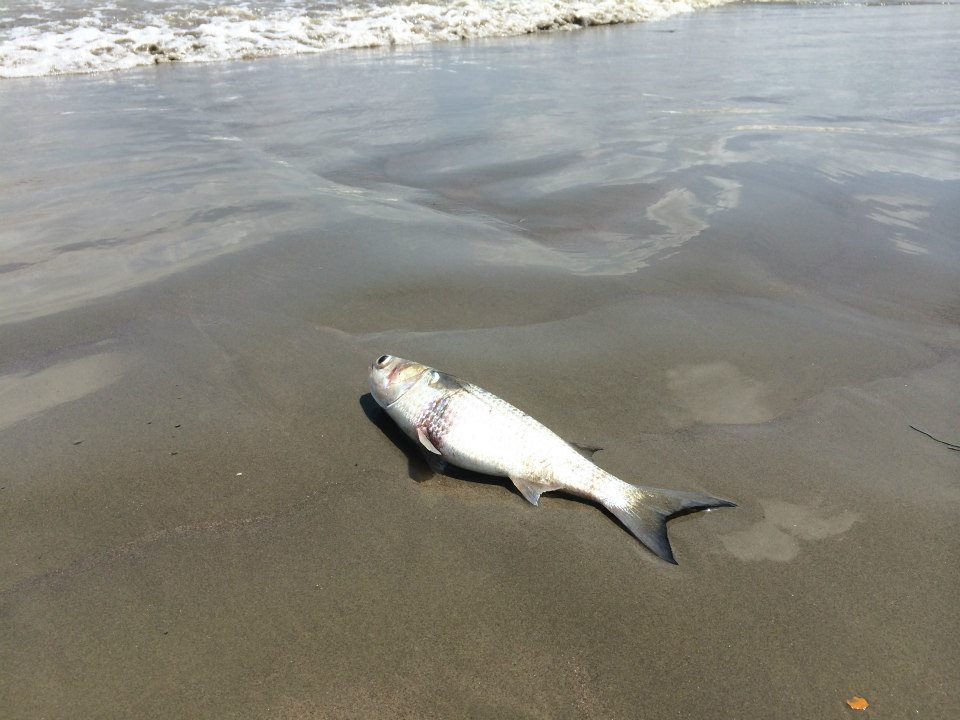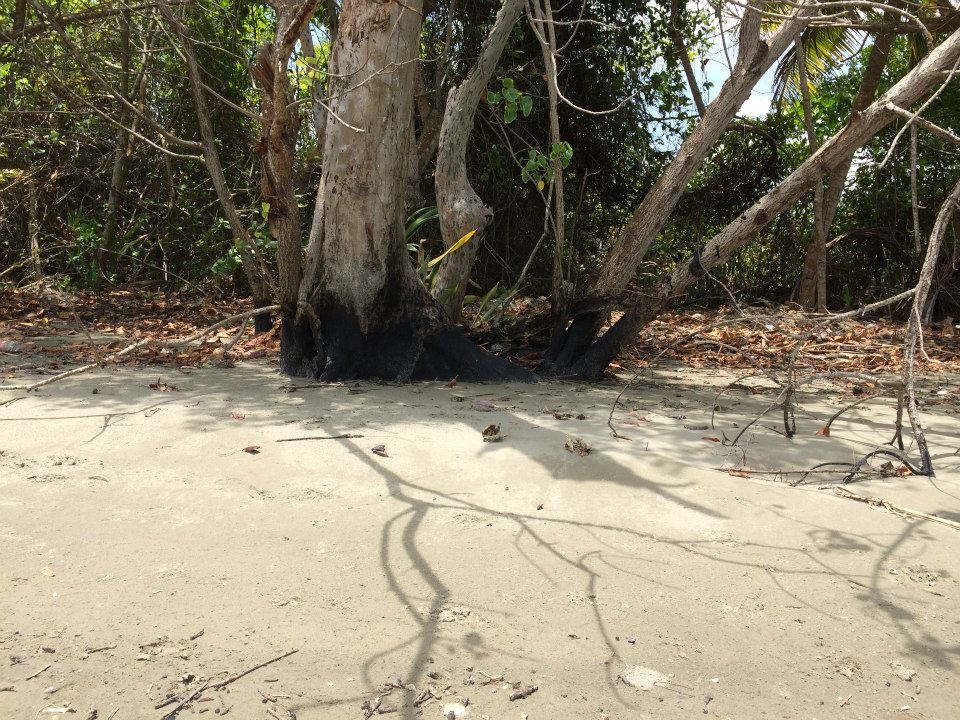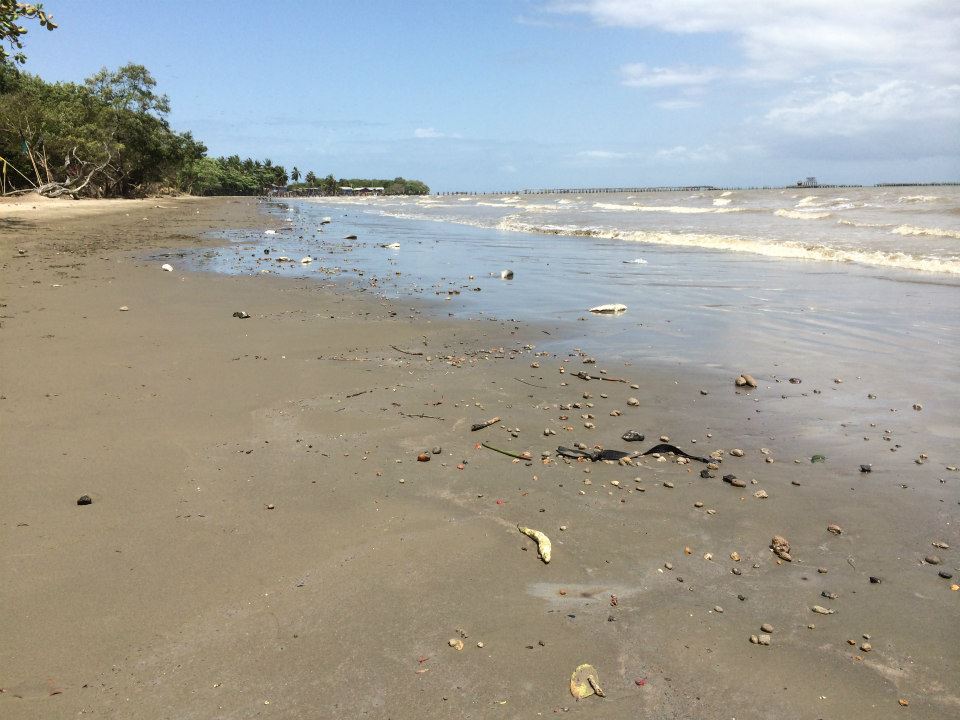
La Brea, Trinidad: “Walking alongside members of the La Brea Fishing Association, it was clear that many of the fish had washed up that very day, their skin glistening and eyes still sparkling.” Photo by Merisa Thompson. Used with permission.
Walking along the beaches of La Brea, Trinidad, three months after the cleanup of an oil spill that sent 7,000 barrels of oil floating towards the shoreline, the sight of hundreds of dead fish scattered as far as the eye can see is astonishing.
La Brea is a small town situated on the southwestern peninsula of Trinidad, the heartland of the Caribbean island's burgeoning oil and gas sector. As the site of the world’s largest natural pitch (asphalt) lake, the history of La Brea—which means “tar” in Spanish—has long been entwined with natural resource extraction. Its coastline looks out onto the Gulf of Paria, a sheltered inland sea of brackish waters that separates the mangrove coasts of Trinidad and Venezuela.
The story that has unfolded since the oil spill in December 2013 is not an unfamiliar one. Local communities and fisherfolk feel let down by the government, the national Environmental Management Authority (EMA) and the actions of the state-owned oil company, Petrotrin. Anybody familiar with BP’s Deepwater Horizon oil spill [1] in the Gulf of Mexico in 2010 will recognize a narrative full of suspicion, a perceived abdication of responsibility, lack of transparency, environmental destruction and loss of livelihoods.
Just as in the US, here in Trinidad there have been accusations of misinformation and cover-up, and controversy over the use of the oil dispersant Corexit 9500 [2], a chemical agent that has been linked to increased toxicity in water, and other negative impacts on human and marine health, so much so that it was banned in the UK as long ago as 1988. Consequently, questions abound regarding the long-term impact on local communities, environments and livelihoods, and the high risks taken by extractive industries.
In March 2014, in the aftermath of the cleanup, the local community and media started to report that dead fish were washing up on the beaches of La Brea and surrounding areas. Initial official attempts at denial soon gave way to accusations that the fishermen were dumping the fish themselves. Then, it was argued that only certain fish populations, such as mullets [3], were affected, and that the cause was not, in fact, the oil spill. Local fishermen, however, are convinced that the use of Corexit 9500 is to blame.
Despite avidly following media debates about the “fish kill”, I was still not prepared for the horrifying sight of hundreds of dead fish that I saw washed up on the beach three months after the spill.
Walking alongside members of the La Brea Fishing Association, it was clear that many of the fish had washed up that very day, their skin glistening and eyes still sparkling. Although there were many mullet, in just a couple of hours we counted no fewer than nine different species, including blinch, catfish, crapo, butter fish, bouchet, crab and even an eel. A few weeks ago, a 1,000-plus-pound dolphin washed ashore [4].
From the piles of dead rotting fish, the oil lines on the trees, the small patches of oil shimmering in the sand, and a small tributary still collecting oil at high tide, it was evident that the effects of the spill and cleanup are still being felt. Residents worry that the area at the back of the beach where oil was buried in the cleanup will eventually resurface as the sea erodes the sand. For communities such as these, the impacts of such disasters can be felt for years.

Aftermath of the spill: oil line on the mangrove trees lining the beach at La Brea, Trinidad. Photo by Merisa Thompson. Used with permission.
Despite extensive national media coverage, a sense that not all sides of the story are being covered pervades. Official pronouncements appear to take precedence over the voices of marginalized people far away from the consciousness of the capital, Port of Spain. The communities in and around La Brea feel let down and neglected, and they nurse an inescapable feeling of injustice. For them, it remains imperative to get to the bottom of why these fish are dying, and investigate the implications for their health, safety and livelihoods, not to mention the wider implications for the food system in a country in which the oil and gas sector plays such a dominant role.
The impact of the oil spill on life in La Brea cannot be overstated. The oil company banned local residents in the Coffee Beach area from cooking with open flames, and therefore had to provide them with breakfast, lunch and dinner. The water has not been cleared as safe for swimming; in the absence of official warning signs, people have simply installed their own. The fishermen suggest that compensation was paid to local boat owners, but not extended to fishermen without boats, to cover equipment lost, or to vendors who have witnessed their supply chain collapse. The fishermen are dependent on the Environmental Management Authority: until it announces publicly that fish from the area are safe to eat, the boats of La Brea will remain moored.
The local perception is that because Petrotrin is state-owned, it is inextricably linked to the activities of both the EMA and the government. So there's a degree of tension between the needs of the local community on the one hand, and those of the state and the national oil company on the other.
The fishing community in La Brea is relatively small compared to others across the island, with around 28 boats spread across the three beaches, and about 50-60 active members. Somewhat uniquely for Trinidad, they practice distinctly sustainable fishing methods such as diving and spearfishing, having learned these skills from a childhood spent diving and fishing from the jetty at Coffee Beach. Some of the fishermen have a complex relationship with the energy sector: those who are certified divers are often contracted to fix pipelines and other underwater equipment.

Three months after the oil spill, the beach at La Brea, Trinidad is still strewn with dead fish. Photo by Merisa Thompson. Used with permission.
This is not the first time an incident like this has taken place. In late 2009, thousands of dead fish, mostly sardines, washed up along these same beaches. The ongoing use of seismic surveys and the practice of blasting for natural gas under the seabed are also believed to have a negative impact on sea life.
Despite affecting what appears to be a microcosm community, this latest disaster raises much broader questions of global significance about the responsibility—or rather, irresponsibility—that oil and gas companies are taking for the environment.
It also forces us to question the transparency and culpability of energy sector operations in Trinidad and Tobago's waters. In the case of the Deepwater Horizon tragedy, BP admitted in court [5] that they knowingly misled the public and US Congress about the number of barrels of oil that escaped into the sea. The company also pleaded guilty to fourteen criminal charges related to the explosion that led to the oil, leading to the largest corporate fine in history.
In a small country like Trinidad, whose development has been predicated on both advanced industrialization and rural livelihoods, and whose communities have a clear stake in the oil and gas sector, whether positive or negative, a way to reconcile these competing tensions should not only be easier, but is desperately overdue.